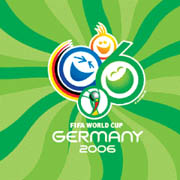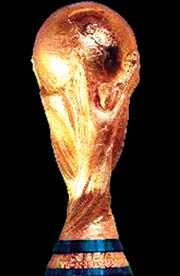
FIFA - World Cup
How it all began ... and what it has become today
The entire world will witness the grand finals of the much awaited
FIFA World Cup next Sunday. Often called the Football World Cup or
simply the World Cup it is the most significant competition in
international football.
The world's most representative team sport event, the World Cup is
contested by the men's national football teams of member nations of
Federation Internationale de Football Association (FIFA), which is the
sport's global governing body.

The championship has been awarded every four years since the first
tournament in 1930, except in 1942 and 1946, due to World War II.
However, the event is often ongoing, as the qualifying rounds of the
competition take place over the three years preceding the final rounds.
The tournament's final phase (often called the "Finals") involves 32
national teams competing over a four-week period in a previously
nominated host nation, with these games making it the most widely-viewed
sporting event in the world.
In seventeen tournaments held, only seven nations have ever won the
World Cup. Brazil is the current holder, as well as the most successful
World Cup team, having won the tournament five times, while Germany and
Italy follow with three titles each.
Of the nine World Cups staged in Europe, before the current
tournament, only one saw victory by a non-European team, that being
Brazil in 1958.
When held outside Europe, the competition has only ever been won by
South American teams. Only two teams from outside these two continents
have ever reached the semi-finals of the competition: the USA (in 1930)
and South Korea (in 2002).
The trophy
From 1930 to 1970, the Jules Rimet Trophy was awarded to the Cup
winner. It was originally simply known as the World Cup or Coupe du
Monde, but was renamed in 1946 in honour of the FIFA president who
organised the first tournament.

In 1970, Brazil's third victory in the tournament entitled them to
keep the trophy permanently. However, the trophy was stolen in 1983, and
has never been recovered. After 1970, a new trophy, known as the FIFA
World Cup Trophy, was designed. This is not awarded to the winning
nation permanently, irrespective of how many World Cups they win.
Argentina, Germany (as West Germany) and Brazil have all won the
second trophy twice. It will not be retired until the name plaque has
been entirely filled with the names of winning nations, in 2038. The new
trophy is 36 cm high, made of solid 18-carat gold and weighs 6175
grammes. The base contains two layers of semi-precious malachite, while
the bottom side of the trophy bears the engraved year and name of each
FIFA World Cup winner since 1974.
World Cup winners retain it until the next tournament, and are
awarded a gold-plated replica rather than the solid gold original.
The first official World Cup
The 1932 Summer Olympics, held in Los Angeles, did not plan to
include football as part of the programme due to the low popularity of
football in the United States. FIFA and the IOC also disagreed over the
status of amateur players, and so football was dropped from the
Games.FIFA President Jules Rimet thus set about organising the inaugural
World Cup tournament to be held in Uruguay in 1930.
The national associations of selected nations were invited to send a
team, but the choice of Uruguay as a venue for the competition meant a
long and costly trip across the Atlantic Ocean, for European sides.
Indeed, no European country pledged to send a team until two months
before the start of the competition.
In total, 13 nations took part - seven from South America, four from
Europe and two from North America.
The first two World Cup matches took place simultaneously, and were
won by France and the USA, who beat Mexico 4-1 and Belgium 3-0,
respectively. The first goal in World Cup history was scored by Lucien
Laurent of France. In the final, Uruguay defeated Argentina 4-2 in front
of a crowd of 93,000 people in Montevideo, and became the first nation
to win a World Cup.
Final tournament
The current finals tournament features 32 national teams competing
for over a month in the host nation. There are two stages; a group stage
and a knockout stage. In the first stages (the group stage), teams are
drawn into eight groups of four. Eight teams are seeded at the draw
(based on both current FIFA World Rankings and recent World Cups), and
assigned a group. The other teams are drawn at random. Each group plays
a round-robin tournament, guaranteeing that every team will play at
least three matches.
The last round of matches of each group is held simultaneously to
prevent collusion between nations. The top two teams from each group
advance to the second stage (the knockout stage). If two or more teams
finish level on points, tie-breakers are used: first is goal difference,
then total goals scored, then head-to-head results, and finally drawing
of lots.[14]The second round, or knockout stage, is a single-elimination
round in which teams play each other in one-off matches, with extra time
and penalty shootouts used to decide the winner. |


